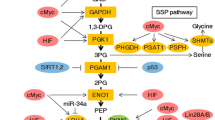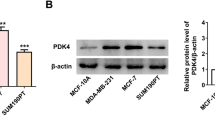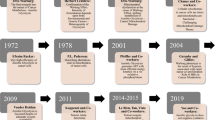Abstract
Background
Aerobic glycolysis has a pivotal role in the carcinogenic process. The current understanding of the functional role and mechanism of UCHL3-related aerobic glycolysis in pancreatic cancer is far from comprehensive, therefore requires an in-depth analysis on this aspect.
Methods
In the present research, the expressions of ubiquitin carboxyl-terminal hydrolase L3 (UCHL3), lactate dehydrogenase A (LDHA) and Forkhead box protein M1 (FOXM1) were detected by qRT-PCR, Western blot and immunohistochemistry. The effects of UCHL3 knockdown or overexpression on pancreatic cancer cells were examined by determining cell viability and colony formation. Aerobic glycolysis was assessed according to glucose uptake, lactic acid production, and lactate dehydrogenase (LDH) activity. Dual-luciferase reporter assay was performed to detect LDHA promoter activity.
Results
The results showed that UCHL3 expression was significantly increased in the pancreatic cancer tissues and cells, and that knocking down UCHL3 noticeably inhibited cell viability and aerobic glycolysis. Further investigations revealed that LDHA expression was promoted by UCHL3 and could be reduced by shFOXM1, and that low-expressed LDHA partly reversed the inhibition of aerobic glycolysis induced by overexpressed UCHL3.
Conclusions
To conclude, this study demonstrates that UCHL3 plays a carcinogenic role by promoting aerobic glycolysis in pancreatic cancer, suggesting that UCHL3 may be a potential diagnostic and therapeutic target for the treatment of cancer.





Similar content being viewed by others
Data availability
The data analyzed during the current study are available from the corresponding author on reasonable request.
References
Siegel RL, Miller KD, Jemal A. Cancer statistics, 2017. CA Cancer J Clin. 2017;67(1):7–30. https://doi.org/10.3322/caac.21387.
Siegel RL, Miller KD, Jemal A. Cancer statistics, 2018. CA Cancer J Clin. 2018;68(1):7–30. https://doi.org/10.3322/caac.21442.
Chen W, Zheng R, Baade PD, Zhang S, Zeng H, Bray F, et al. Cancer statistics in China, 2015. CA Cancer J Clin. 2016;66(2):115–32. https://doi.org/10.3322/caac.21338.
Miller KD, Siegel RL, Lin CC, Mariotto AB, Kramer JL, Rowland JH, et al. Cancer treatment and survivorship statistics, 2016. CA Cancer J Clin. 2016;66(4):271–89. https://doi.org/10.3322/caac.21349.
Boulaiz H, Ramos MC, Grinan-Lison C, Garcia-Rubino ME, Vicente F, Marchal JA. What’s new in the diagnosis of pancreatic cancer: a patent review (2011-present). Expert Opin Ther Pat. 2017;27(12):1319–28. https://doi.org/10.1080/13543776.2017.1379991.
Long J, Luo GP, Xiao ZW, Liu ZQ, Guo M, Liu L, et al. Cancer statistics: current diagnosis and treatment of pancreatic cancer in Shanghai, China. Cancer Lett. 2014;346(2):273–7. https://doi.org/10.1016/j.canlet.2014.01.004.
Xie F, Ye L, Ta M, Zhang L, Jiang WG. MTSS1: a multifunctional protein and its role in cancer invasion and metastasis. Front Biosci (Scholar edition). 2011;3:621–31. https://doi.org/10.2741/s175.
Zeleniak AE, Huang W, Brinkman MK, Fishel ML, Hill R. Loss of MTSS1 results in increased metastatic potential in pancreatic cancer. Oncotarget. 2017;8(10):16473–87. https://doi.org/10.18632/oncotarget.14869.
Agarwal E, Robb CM, Smith LM, Brattain MG, Wang J, Black JD, et al. Role of Akt2 in regulation of metastasis suppressor 1 expression and colorectal cancer metastasis. Oncogene. 2017;36(22):3104–18. https://doi.org/10.1038/onc.2016.460.
Huang XY, Huang ZL, Xu B, Chen Z, Re TJ, Zheng Q, et al. Elevated MTSS1 expression associated with metastasis and poor prognosis of residual hepatitis B-related hepatocellular carcinoma. J Exp Clin Cancer Res CR. 2016;35(1):85. https://doi.org/10.1186/s13046-016-0361-8.
Guo Y, Li X, Sun X, Wang J, Yang X, Zhou X, et al. Combined aberrant expression of NDRG2 and LDHA predicts hepatocellular carcinoma prognosis and mediates the anti-tumor effect of gemcitabine. Int J Biol Sci. 2019;15(9):1771–86. https://doi.org/10.7150/ijbs.35094.
Liu YJ, Fan XY, Wang AD, Xia YZ, Fu WR, Liu JY, et al. LDHA suppression altering metabolism inhibits tumor progress by an organic arsenical. Int J Mol Sci. 2019. https://doi.org/10.3390/ijms20246239.
Woodford MR, Chen VZ, Backe SJ, Bratslavsky G, Mollapour M. Structural and functional regulation of lactate dehydrogenase-A in cancer. Future Med Chem. 2020;12(5):439–55. https://doi.org/10.4155/fmc-2019-0287.
Luo K, Li L, Li Y, Wu C, Yin Y, Chen Y, et al. A phosphorylation-deubiquitination cascade regulates the BRCA2-RAD51 axis in homologous recombination. Genes Dev. 2016;30(23):2581–95. https://doi.org/10.1101/gad.289439.116.
Wang M, Yu T, Hu L, Cheng Z, Li M. Ubiquitin carboxy-terminal hydrolasel3 correlates with human sperm count, motility and fertilization. PLoS ONE. 2016;11(10):e0165198. https://doi.org/10.1371/journal.pone.0165198.
Fekrmandi F, Wang TT, White JH. The hormone-bound vitamin D receptor enhances the FBW7-dependent turnover of NF-κB subunits. Sci Rep. 2015;5:13002. https://doi.org/10.1038/srep13002.
Song HM, Lee JE, Kim JH. Ubiquitin C-terminal hydrolase-L3 regulates EMT process and cancer metastasis in prostate cell lines. Biochem Biophys Res Commun. 2014;452(3):722–7. https://doi.org/10.1016/j.bbrc.2014.08.144.
Zhao B, Tsai YC, Jin B, Wang B, Wang Y, Zhou H, et al. Protein engineering in the ubiquitin system: tools for discovery and beyond. Pharmacol Rev. 2020;72(2):380–413. https://doi.org/10.1124/pr.118.015651.
Yu J, Qin B, Lou Z. Ubiquitin and ubiquitin-like molecules in DNA double strand break repair. Cell Biosci. 2020;10:13. https://doi.org/10.1186/s13578-020-0380-1.
Wu W, Liu X, Wei L, Li T, Zang Y, Qian Y, et al. Tp53 mutation inhibits ubiquitination and degradation of wisp1 via down-regulation of siah1 in pancreatic carcinogenesis. Front Pharmacol. 2018;9:857. https://doi.org/10.3389/fphar.2018.00857.
Hou P, Ma X, Zhang Q, Wu CJ, Liao W, Li J, et al. USP21 deubiquitinase promotes pancreas cancer cell stemness via Wnt pathway activation. Genes Dev. 2019;33(19–20):1361–6. https://doi.org/10.1101/gad.326314.119.
Chen H, Li L, Hu J, Zhao Z, Ji L, Cheng C, et al. UBL4A inhibits autophagy-mediated proliferation and metastasis of pancreatic ductal adenocarcinoma via targeting LAMP1. J Exp Clin Cancer Res CR. 2019;38(1):297. https://doi.org/10.1186/s13046-019-1278-9.
Frickel EM, Quesada V, Muething L, Gubbels MJ, Spooner E, Ploegh H, et al. Apicomplexan UCHL3 retains dual specificity for ubiquitin and Nedd8 throughout evolution. Cell Microbiol. 2007;9(6):1601–10. https://doi.org/10.1111/j.1462-5822.2007.00896.x.
Fang Y, Fu D, Shen XZ. The potential role of ubiquitin c-terminal hydrolases in oncogenesis. Biochem Biophys Acta. 2010;1806(1):1–6. https://doi.org/10.1016/j.bbcan.2010.03.001.
Song Z, Li J, Zhang L, Deng J, Fang Z, Xiang X, et al. UCHL3 promotes pancreatic cancer progression and chemo-resistance through FOXM1 stabilization. Am J Cancer Res. 2019;9(9):1970–81.
Zhang MH, Zhang HH, Du XH, Gao J, Li C, Shi HR, et al. UCHL3 promotes ovarian cancer progression by stabilizing TRAF2 to activate the NF-kappaB pathway. Oncogene. 2020;39(2):322–33. https://doi.org/10.1038/s41388-019-0987-z.
Cai H, Li J, Zhang Y, Liao Y, Zhu Y, Wang C, et al. LDHA promotes oral squamous cell carcinoma progression through facilitating glycolysis and epithelial-mesenchymal transition. Front Oncol. 2019;9:1446. https://doi.org/10.3389/fonc.2019.01446.
Wang J, Wang H, Liu A, Fang C, Hao J, Wang Z. Lactate dehydrogenase A negatively regulated by miRNAs promotes aerobic glycolysis and is increased in colorectal cancer. Oncotarget. 2015;6(23):19456–68. https://doi.org/10.18632/oncotarget.3318.
Wu H, Wang X, Wu T, Yang S. miR-489 suppresses multiple myeloma cells growth through inhibition of LDHA-mediated aerobic glycolysis. Genes Genom. 2020;42(3):291–7. https://doi.org/10.1007/s13258-019-00900-z.
Karunarathna U, Kongsema M, Zona S, Gong C, Cabrera E, Gomes AR, et al. OTUB1 inhibits the ubiquitination and degradation of FOXM1 in breast cancer and epirubicin resistance. Oncogene. 2016;35(11):1433–44. https://doi.org/10.1038/onc.2015.208.
Cui J, Shi M, Xie D, Wei D, Jia Z, Zheng S, et al. FOXM1 promotes the warburg effect and pancreatic cancer progression via transactivation of LDHA expression. Clin Cancer Res Off J Am Assoc Cancer Res. 2014;20(10):2595–606. https://doi.org/10.1158/1078-0432.Ccr-13-2407.
Liu C, Shi J, Li Q, Li Z, Lou C, Zhao Q, et al. STAT1-mediated inhibition of FOXM1 enhances gemcitabine sensitivity in pancreatic cancer. Clin Sci (London, England 1979). 2019;133(5):645–63. https://doi.org/10.1042/cs20180816.
Funding
None.
Author information
Authors and Affiliations
Contributions
DT and YF designed the study. DT, DH, DL and YT, QT and YC performed the experiments. DH, DL and YT contributed to the literature search. QT and YC wrote the initial draft of the manuscript. LD and DT reviewed and edited the manuscript. All authors read and approved the manuscript.
Corresponding author
Ethics declarations
Conflict of interest
The authors declare no conflicts of interest.
Ethical approval and consent to participate
All procedures performed in studies involving human participants were in accordance with the ethical standards of the institutional and/or national research committee and with the 1964 Helsinki declaration and its later amendments or comparable ethical standards. No animals are involved in this research.
Patient consent for publication
Not applicable.
Additional information
Publisher's Note
Springer Nature remains neutral with regard to jurisdictional claims in published maps and institutional affiliations.
Rights and permissions
About this article
Cite this article
Fan, Y., Hu, D., Li, D. et al. UCHL3 promotes aerobic glycolysis of pancreatic cancer through upregulating LDHA expression. Clin Transl Oncol 23, 1637–1645 (2021). https://doi.org/10.1007/s12094-021-02565-1
Received:
Accepted:
Published:
Issue Date:
DOI: https://doi.org/10.1007/s12094-021-02565-1




